‘We’re protected from their malice by their incompetence’ – Laurie, Brighton.
Strange times, these. Everyone seems to believe so much is wrong, but no-one’s offering a way forward. We’ve become uneasy about right answers, and fixated with locating wrongs. Hope has become a debased currency, one feels embarrassed at the exchanges about even taking it out one’s pocket. Clunky, greasy, funny spelling, weird symbols. Better traded for cynicism or snide complaining. Wandering around the marketplace of ideas, all one hears is the hullaballoo of people demanding refunds.
I’ve been travelling across a land-mass and nearby islands where not even the English language is a universal definer. There’s a vague sense of common-ness among the peoples I’ve met, but the regions, cultures and histories of these islands are so diverse that I can no longer imagine them as one country, say ‘the United Kingdom’, on a map. You can call it ‘UK’ if you like. But there is no king here, and little united about it. UnKnown might be more apt.
So little understood, it’s easier shrouded in clichés. But clichés are mental short-circuits that elude the burdensome business of actually thinking, and so clichés should be avoided when trying to understand a place (unless, perhaps, a new, useful cliché…?). You might wonder, is it necessary to spend 121 days cycling the breadth and circumference of an island in order to understand it? Couldn’t one stay at home and consult maps, economic statistics, write to a popular theorist, watch the news, search ‘#Britain’, and read a few books? Perhaps one could check out a few of the sights with Google Maps, or even write a travelogue about one’s own little room like Xavier de Maistre.
I can only cite my own experience. Travelling has expanded my mind and extended my awareness of life on these islands in an unexpected way. My thoughts suddenly feel much smaller than before. It is like growing up and living in the same house, all one’s life. Four rooms, four walls, one door in and out. One day, sat in one’s imaginary kitchen where all the best ideas are born, your finger probes the line of an unfamiliar experience, idea, or question. What you thought was a wall behind you turns out to be a covered-over door. So you start to scrape away old assumptions, old values, in order to get to that door, to find the handle (perhaps it needs a key), and to open it up. It’s been concealed for some time, and as you venture in, there’s no light, and little to guide you. There are dark objects strung all around the floor, so you tread carefully at first. Is this another sitting room, another kitchen, or another kind of room altogether, a classroom, a workshop, a dentist’s chair, a library? That dark space that was behind you, hidden from you, turns out to be massive, daunting, and maybe even endless. When does one room end and another begin? Soon your eyes start to adjust. What felt like a small but liveable house, four rooms, four walls, one door, turns out to be just one chamber in a potentially infinite-extending high-rise of experiences.
Me and my wounded knee surface on a sofa in Brighton. I’m up Albion Hill and have William Blake in my head, which is about as close as I’ll get to my ideal on this trip. ‘The desire of Man being Infinite, the possession is Infinite & himself Infinite’, says Blake, garbled in a dream. The only antidote I can find to our obvious insignificance, individually, is our participation in a collective activity, of not simply being alive, but living adequately, living well, living as if infinite, as if one had to live this life over and over again, living in a way that humans could live for infinity. I’m with friends, Erin and Neil. Food, drink, friends, inspired conversation, and William Blake: factor in sixty miles psychyclic exploration, and that makes a perfect day.
We eat breakfast together and chat. Before writing about film professionally, Neil used to run a video shop. He’s known Brighton a long time, and talks about how it’s changed. Rising rents and house prices are a big issue. ‘The biggest changes I’ve seen are round St. James street. There used to be one small supermarket there. Now there’s five or six. I remember the Tin Drum, an independent coffee shop that’d been there for 20 years, comfortable leather sofas… The Co-op called the landlord and offered them much more money, and it closed down. Now it’s an extension of the Co-op. But do we need it?’ Need rarely comes into it, and most town centres have been defined by a new phenomenon of local and express supermarket stores, with huge hypermarkets run by the same companies dominating their periphery. Markets and independent traders have been suffocated. Brighton seems to have resisted this Tescoisation better than most towns, but it’s not been immune. Neil mentions a Starbucks opening by a popular local coffee shop, the Red Roaster. It reminds me of the Costa in Warminster: locals might tell the owner they favour local business, but the loyalty cards and ten pence cheaper coffees suck them in. ‘It’s the tourists, the passers-by, they make the difference. And they see something familiar and…’
But we need our treats, our little escapes. Brighton’s long been the escapism of London, with its dirty weekends, grey bedsheets and ghastly floral curtains, a flat gin and tonic rhythmically tremoring on the sideboard. Like the mark left behind of the glass on that sideboard, Brighton’s there in the seediness and menace in the novels of Patrick Hamilton and Graham Greene, in the images of brawling mods and rockers, or Phil Daniels in Quadrophenia, the skinheads interviewed by Nick Knight, one that’s been pressure-scrubbed in more recent times by vintage clothes shops and the whiff of freshly-iced cupcakes. ‘Watching the telly and thinking bout your holidays’, the Jam blaring out of the vintage clothes shops, motorbike jackets, cravats, cowboy boots, adults playing dress-up. Comic books and cult film shops. Another drink, forget yourself… ‘two lovers missing the tranquillity of solitude.’ Anthropology students getting out of their heads and falling about the streets, talking horsily about grime music or Gramsci, later, spliff smoke on the beach, sixteen again, confusing one’s own confusion as testament to maturity.
‘I just hated it, it was a dead end job, but they always held out the promise of promotion. … I’d get home, lie on the sofa, not even put on the TV, just stare at the ceiling, and think what am I doing?… You just had to go into zombie mode, hold it down, but it was so tiring.’ Erin’s relieved to be out of secretarial work. Her frustration and coping mechanisms remind me of much though, of how often we tolerate the intolerable because we believe it cannot be changed. ‘Accept like a curse an unlucky deal’, Ian Curtis sung back in Manchester. Strange fatalism, ours.
I’m wandering around Brighton, threading through the lanes. I pop into Jump the Gun, a stylish gents clothiers to try out the jackets, this weather getting cooler, but nothing fits my wiry frame. Conversation is more rewarding here. Laurie gives the skinny on Brighton’s politics. ‘There’s only a certain amount of times a day you can be outraged. … People don’t realise that crime’s going down, that we’ve got a standard of life today that generations before could only dream of. But high rents have pushed him out to Worthing. It’s a common problem. ‘Brighton has become too expensive especially in last few years. It’s people from London, then Hong Kong… Oh I can get a one bedroom flat here for £200,000, I’ll get two of those. … My parents bought their place in ‘93 for £70,000. It’s now worth half a million.’ They’re inundated with flyers from estate agents, like Ariel was in Horsham (‘five to six I get, just in a week’, he’d told me).
‘Good place though. Liberal. But… There’s problems with the council.’ I’ve heard enough already from Neil, and gleaned from studying the news over the last few years, and Laurie shares the same story: great hopes when a Green council was elected in 2011, a year after their election of the country’s first Green MP. The great Green hope, a liberal flourishing… the new council was quickly plagued by in-fighting, bin strikes, and a collapse in public esteem. ‘I’d never vote Green on a local basis again. … It was the first I was actually inconvenienced by a council on a regular basis. The city centre was uninhabitable’. I hear of uncollected rubbish, parking costs, speed restrictions, the usual gripes.
By local authority standards, the people of Brighton could’ve had far worse. Their record on resisting chain stores, improving the centre, and pressing local employers to pay a living wage is impressive. Malcontents of Hove: get in your Toyota Priuses and drive down to Newhaven if you disbelieve me. At the same time, the success-and-failure of the Greens should impress a lesson often slowly learned, quickly forgotten: electoral success does not translate into policy implementation. Power corrupts? Not morally, not personally (Nick Clegg was not bitten by a vampire shortly after entering 10 Downing Street…), but there is remarkably little an elected representative can do when a political system is operating on pre-established modes and towards certain outcomes. The Greens alone could not have resisted local authority spending cuts, leading to the disputes with the bin-men; decisions by the previous government and the weight of their partners meant that the Lib Dems could not have resisted increasing tuition fees. There is the issue of ethics: if one cannot act, one should explain why, and not act, rather than mis-act. Barack Obama’s presidency is perhaps the best example of the powerlessness of an elected representative. We need a dramatist of Shakespeare’s stature to capture such melancholia and vacillation.
Is this an apology for power then? No, not at all. It’s a warning that little will be achieved by a surge in votes for groups like the SNP, or the Greens, if the outcome is the resumption of politics as currently constituted. Political parties follow similar positions in government: the Tories under Macmillan built more council houses than their Labour predecessors; New Labour pursued the free market reforms of Thatcher and Major though with a softer face. Owen Jones, Tom Paine and William Cobbett are either patronising us or being plain foolish when they talk about ‘the Establishment’ or ‘the thing’ as a singular homogeneous group of scheming avaricious toffs. It’s a network of different power interests, from parliamentary party leaders to think-tanks and academics, from business leaders who donate to influence taxation to those with a political interest in an aspect of foreign policy. I don’t see a common self-interest at work either: at times it’s just a shared culture at work, a shared social status, particularly among journalists educated at the same private schools, pals at Oxbridge, or newspaper editors who see themselves (rightly or not) as outliers or helmsmen of public opinion. Within the current constitutional setup, reform of the House of Lords is necessarily impossible, whereas privatisation of the NHS or Scottish independence are, eventually, inevitable. The continued accumulation of financial capital, reported as continued economic growth, is the shared concern, broadly, of this network. But concerns change, and interests also collide. Business interests in user data privacy against state surveillance; neoliberal thinktank’s calls for total state withdrawal from welfare provision against the state subsidising of the housing and incomes of a workforce in order to staff low-pay supermarkets and distribution warehouses.
If change is sought, which I believe it has to be – for how many centuries longer can the residents of this country be disserved, disenfranchised? – then it has to begin at the constitutional level. And unlike say Iceland, this won’t be an easy win, a collective constitutional writing exercise, a nice civil fun day away. We ought to look at the experiences of Africa to understand how a sustained popular uprising might play out (financial institutions, trading partner-states and international trade organisations playing the role of former colonial powers). Much is powerfully invested in this way of things, and won’t wish to give it up.
There will be no effective constitutional reform without also addressing a democratic deficit. Are the residents of England capable of fulfilling the role of responsible, informed citizens in a directly democratic state? Their position is fatally compromised if they’re not adequately aware of basic facts about the state, or their society. Harmful decisions will be made, incompetence and corruption will ensue, and eventually calls will be made for a return to ‘strong leadership’. Aristotle observed the tendency of democracies to slide into tyrannies. Reflecting on this two thousand years later, Spinoza jump-starts the seemingly dead idea of democracy by arguing that it can only survive when citizens possess sui juris, their own right, a degree of social, economic and political independence. Spinoza wrote about societies ‘as they are’, not as one might want them to be. Deal with facts as they stand. In his model, criminals, children, servants, women, and indeed most men of insufficient income were excluded from his democracy. Who possesses their own independence now?
There are fetters of debt, of work, of religion, of ignorance, of misinformation. Reforms that led to what we’d now consider ‘rights’, like mass literacy, the vote for women, the abolition of the death penalty, reform to divorce law might not’ve passed a referendum. Some were forced into action by campaigns that represented only minorities. Democratic citizens are made, not born, and I see that change has the best chance of success at the democratic level, from extensions of adult education and the regulation of reported news to statutory caps on the working-week, giving (or perhaps forcing) citizens to work less, and so read and discuss more.
‘I just had to find a way to understand the way he dealt with things, but there is none…’ I’m wandering up Gardner street, past strings of uber-höflich high-schoolers. I cut through to the pier, and cycle along the beach parade, past beach shacks and the Concorde gig venue, teetering under the weight of an overhanging road, but somehow still alive. I’m following a car-cluttered road east, exiting the Regency town centre and crossing through the ugly housing blocks of Kemptown and over Brighton Marina, an utterly stupid retail park and housing complex built in the most ugly fashion imaginable, concrete spurts, generic pseudo-heritage high-rises, car-parks, a supermarket, ‘feeding the ducks and wishing I was far away’. To be fair, it doesn’t get much better hereafter. Saltdean is an ugly little town further up the coast, and Newhaven even worse, clearly fallen into hard times. The town attracts waste for its incinerator, cars for its ferry service, and little else. A local man, American actually, but living here some decades, tells me about the town’s unemployment, ‘not much is going on’, a working-town but without the work; a taster, as if the south-east were ever to heed it, of what much of the rest of England looks like. Ride on.
The coastline becomes a little more dramatic hereafter, with some splendid if tough climbs as it weaves up through Seven Sisters Country Park and towards the undulating fields around Beachy Head. Being particularly drawn to the darker side of places, I decide to veer off at East Dean to visit this common suicide spot, and think about what its image has meant. Suicide is the single biggest killer of men aged under 45 in England and Wales, and numbers of recorded suicides are rising. It’s a male issue, too: eighty percent of suicides are male, and this gender difference has increased over the last thirty years. The actual figures are likely an underestimate, as not all coroners adequately record a suicide. It affects younger men and older men, there’s no single profile here, except that, actually, of gender itself. Is it something built into the chemistry of Real Men? No, but manning up, being strong, and the stiff upper lip are common ideas about what masculinity should be, which shapes how men react to events in their lives, and affects how they choose to deal with them (or not). I know a fair bit about depression and suicide, through my work as a campaign coordinator for a suicide prevention charity, and through what I’ve known in my life.
The terrain pricks out of the landmass here, tugging hills beside it to the point of Beachy Head. I think of Phil Daniels in Quadrophenia racing Sting’s stolen moped along here, depressed, disappointed, and sick of those two feelings. Does he ride off the edge? No, though for a while it’s in doubt. Others have. The cliff-edges slope up and down, up and down, with gaping holes in the turf. The drop is steep and sharp, without an attempt at fencing. A great lighthouse looms below. More strings of German high-schoolers, singing songs and somersaulting down the steep hills. There’s a withered clump of flowers placed nervously in one spot besides a small white card, the sliding cursive running off the edges and into the grass. I wonder who was left behind. I wonder why they did it, and what was running through their minds, or what wasn’t. It feels useless trying to render into prose the desperation and misery that would’ve made that decision feel… inevitable, irreversible. Incongruously, there’s no overwhelming feeling of sadness or pain here. It feels just so empty, as if the decision had been made long before, as if the sadness was neutralised with some kind of awful relief.
There’s a small Samaritans sign here, and a sign in the toilet appealing for information about a missing man, a fella in a suit and tie, looking respectable, you’d’ve never thought he was the type, he was always smiling… Does the media’s discussion of suicide in relation to a ‘hotspot’ increase the likeliness that people will take their lives there? In Bridgend, Wales, there was a marked connection between the publicisation of suicides and then distressed young people taking their lives. Here, it’s possible, but the problem are the mental states that lead to suicide, about the opportunities (or lack of) for people experiencing those states to get some help, and the cultural ideas of masculinity that might inhibit them from taking up that help.
I’ve increasingly felt ambivalent about my old views since leaving home on this trip, but not all of them. We face a crisis of mental health. Few are the young people and adults I’ve met not currently or previously afflicted with some kind of mental health problem, be it depression, anxiety, panic attacks, eating disorders, self-harming, suicidal thoughts, elements of obsessive-compulsive disorder. Depression, anxiety and suicidal thoughts are heavily influenced by economic and social circumstances, like long-term unemployment, insecurity in the workplace, bullying, redundancy, and, I think, a heavily exam performance focused education. A recent survey of 2,000 long-term unemployed 16-25 year olds by the Prince’s Trust found that one in three had contemplated suicide, and just under a quarter self-harmed. Despite that, there’s ample evidence that mental health problems are affecting the apparently successful too. Innumerable sportsmen have come forward to share their experiences; some sadly, did not. Perhaps there’s a generational aspect, perhaps young people are more comfortable talking about their mental health and therefore seeking treatment. Possibly, but that’s not all the picture. This year, ChildLine has found that the number of children who have called to talk about killing themselves has more than doubled since 2010/11. Bullying on social media is cited as one factor. Mental health problems are going to inevitably worsen on all counts. So we need to start talking about that. And the first place is with those we know, with those we care about. Fuck, this life can be a lonely business, but it need not be.
Come, let’s move on, and explore some sunnier parts of the mind. I plunge down into Eastbourne along a swirling snaky hill that twists into the western edge of town. It’s actually fairly small, and there’s not a great deal to see besides pacemaker courts, zimmer-frame high-rises and bungalows, prissy-preened privet hedges and tip-top lawns. The long sea-front is a pretty spectacle, its orderly lawns, memorial benches and recently burnt-down pier all conveying the air of a well-aged, fastidious yet gentle old lady, doyleys and digestives, Virginia Woolf’s Mrs Brown, on the verge of financial ruin, Pension Credit claim rejections in a pile behind the bone china fruit bowl.
I talk to one local mum about the wreckage. ‘It happened back in July. At first they thought it was suspicious, now they’re not saying anything.’ ‘And what do you think?’ ‘I’m not so sure…’ She thinks the town is lovely, a great place to bring up children, and points out the sandy beach, the cream bay windows. Eastbourne’s faded, certainly, but there’s a homeliness about that too. But it’s mainly a magnet for retirement, elderly persons now living alone, drawn back to the seaside as they were back in youth, places where they fell in and out of love, et cetera, et cetera, back again, one last time.
East of Eastbourne, I cycle through Pevensey and Pevensey Bay, through pleasant and flat Sussex country, occasionally skirting the sea. I’m riding through bungalowlalia for much of it, mind, particularly as I reach Bexhill. The only thing that seems to link the neighbours of these grey terraces of early 20th century drab housing are the telegraph wires, the only hint of communal intimacy, a pot-holed road that links A to B. The residents seem to have erected whatever obstruction necessary to demarcate their private space from their neighbours, through walls, fences, gates, and wide-vacant front gardens, voids that give an additional cavity insulation from the potential trauma of interacting with others. Most have been repurposed into drives for oversized vehicles. It’s another expression of a kind of Americanisation of England which has occurred over the 20th century, facilitated by the cinema and then the aspirations and desires of motor car travel.
Bexhill then. Well no, Bexhill later… Just as my mind’s doing its predictable Jonathan Meades-style snidey slagging off of the mediocre landscape, the terrain takes its revenge, and a small pot-hole manages to kill one of my pannier bags. Shot down dead, the hooks are completely snapped by the jolt. Inside, I discover later, my laptop screen has been faintly shattered. With a bit of creative thinking, I manage to tie the bag over the back of the bike, which then requires all my sleeping gear hanging from a small cord around that. In short, precarious and unsteady. But with only three days left, I decide to press on with this. Bexhill itself is more dull than Eastbourne, and there are more nursing homes, oversized crossword books and warfarin prescriptions here (well, the first one, definitely…). The De La Warr Pavilion is interesting though. Its streamlined figure, dashing curves and dramatic windows are unlike anything else along the south coast. It was one of the first Modernist buildings in the country, ambitiously built by a wealthy earl and socialist mayor of Bexhill during the Depression of the Thirties. It’s now a fussy arts centre, but a pleasant place to stop and take in the view.
It’s not what I imagined after watching the dystopia Children of Men, set in a near-distant future where the human race has become infertile, and civil war and societal collapse is engulfing the world. Bexhill is the site of a huge refugee camp, where the civil servant protagonist played by Clive Owen plots an escape with a mother and her newly-born child. It’s an unlikely postcard about the value of suffering, struggling and giving one’s life in order to produce a better future. Bexhill, how? It’s a small town and run-down in parts, union jacks aflutter, but dotted with surprises, like its modern beach shelters, timber and glass cast into unlikely shapes submitted to sunlight, showing what’s possible even with the familiar.
Out of Bexhill, I ride along a cycle path that takes me into the town of St. Leonards, a tatty and glum looking place that’s seen happier days. There are long rows of beach houses that still offer refuge and escape, but most are shuttered up now, the season done, the sun coughing heavily before mumbling its excuses onto the answer machine. There’s a cheery weather station along the promenade that seems to still be in operation. Surely overcast and grey is a safe bet though? Well, on I ride, St. Leonards merging into the town of Hastings. There’s more energy to it than anywhere else I’ve passed since Brighton, and there’s a good number of young people milling around the old town, among its second-hand bookstores and enticing coffee-shops along George street. The University of Brighton has a campus here, and the unlikely buzz reminds me of the cultural and civic value that university campuses have brought so many of the towns I’ve passed through, most of which have suffered some kind of serious decline in the last fifty years, be it in changing leisure habits, like the seaside, or in the rapid demise of industries. There’s a large amusement park by the sea, much it looking exactly as it did fifteen years ago when I last came here, a child. Depopulated amusement arcades face that, fruities trilling and penny-machines clip-clopping, the machines having all the fun. I love it. Classic seaside, tat and all. Hastings has it. Fitting the bill, Hastings also has a mysteriously-destroyed pier, barely fenced off, with an insincere and lily-livered gesture at Regeneration. Most of the chippies are shut, but I find relief in one, fine stuff.
I drift into the Albion pub, enticed by the name and the sheer hostility of playing Nirvana at full blast on a weekday afternoon. It’s a neglected, traditional boozer – dark timber panels, random objects pinned to walls, hardback novels by forgotten Victorian bores, and its bar is ringed by the most morose and sullen collection of people I’ve ever seen. All are strangers to each other, there’s no funeral here. Feeling perverse, I ask them all collectively about life in Hastings. The barman is friendly and attempts enthusiasm, but the rest shrug, stare heavily into the air, are unable to say anything lucid at all about the place. ‘From a business view, it’s a good place to work, small businesses look out for each other here’, I hear. The decline’s so pronounced there’s got to be some gothic pleasure in it, as if each person here is enjoying their own private psychodrama playing Mrs Haversham in the attic. I ride on.
Now, should I tell you about the monumental importance of the Battle of Hastings, transforming the fate of England, initiating the gradual demise of common land, nomadic roaming, and the original freedom of the Saxon before falling under Norman yoke? I could, but it’d be anachronistic, slightly bollocks, and it’d involve having to cycle up a hefty hill to the area now called Battle some miles north of Hastings. Time’s of the essence, and my destination’s east, along the coast. It’s also in a whole other county. So I push on, seeing Sussex out to its logical completion. The ride out of Hastings is wondrous: I push up through the older part of the town, the road eventually threading higher and higher into a winding cycle path that rides through a small forest, reaching Fairlight and plunging down to Pett Level, a seaside hamlet with little else except a charming self-confidence. ‘Leave it behind… just get me to Pett level’, a mock-Liechenstein pop mural on apartment block suggests. And why not? A key element in the pleasure of the British Seaside is a camaraderie in its disappointment. The weather, the much-abused donkey, lettered rock too dangerous for dentures, the dirty deck chairs, peeling shacks, the overpriced cod and chips which is probably Pollock and oh they’ve been cooking these same chips for two weeks… There’s pleasure in that disappointing homeliness, the safety of having one’s low expectations validated.
But after the climb out of Hastings and dramatic tumble down at Fairlight, the landscape markedly changes. It is now remarkably flat. The tide’s edge often forms a higher point than the low, boggy fields behind it, where herds of sheep drift nonchalantly about. This is Romney Marsh, a desolate expanse of wetland stretching over Sussex and Kent. There is little here except sheep, and the hardy breed here have been exported out to the rest of the world on account of their ability to resist the land’s many parasites. One statutory stipulation of living here during the Middle Ages was malaria: if one did not already have ‘marsh fever’ one would soon be gifted it in this fetid no man’s land. William Camden once called this a ‘Gift of the Sea’. Sooner it would return it. I’ll be cycled through these strange, abyss-like bogs for the remainder of today and much of tomorrow. Weird energies fester in its depopulated expanses. One could imagine stumbling upon a troll or half-formed man a mile or two off the narrow roads, lost amongst the infinite shingle or boggy expanses. Much of it, particularly approaching the Denge peninsula and Dungeness, will require strong mental reserves.
It’s still quite pleasant at this point. I pass Winchelsea, an underwhelming little settlement that once brought inspiration to Millais and Turner. From the shoreline, one sees in faint form those wild and bleak seascapes dramatized by those painters, though one mustn’t become too attached to a place when seeking out the source of imaginary genius. In clouds and unexceptional Essex fields, Constable recognised turbulent and enchanting expressions of natural forces. St. Ives boasts a distinctively stark luminosity which has attracted painters, but a far superior quality of light will be found in the northern Highlands. Still, there is something about Kent which is mysterious. I’ll expand on that as I continue on. It’s going to get very strange reader, be warned.
I stop at a local Co-op for supplies, biscuits, spinach, and information. There’s a small but seemingly well-established community here, and the accents have also changed a little, a kind of flatter and more monotonous, nasal drawl, like that one hears in the suburbs of south London. It’s a terrain marked by bungalows, semi-detacheds, ‘Pub 31’ and the community caff (no jest, these places are, like Chinese takeaways, all-too common and popular). ‘There’s not much here’, says a local young man, though with none of the disappointment or wanderlust I heard on Wight or Cornwall. When pushed, he talks of fishing and surfing. Quiet, as people like it.
From Winchelsea I ride into Rye, a charming old Cinque Port. Rye developed as a significant centre of cross-Channel trade with Europe during the early middle ages, though a combination of French harassment, silting and its relatively small harbour size brought legitimate trade into decline at the expense of some serious smuggling. Rye became a centre for ‘owling’, a confusing term for wool smuggling, and drifting around its old buildings, one can imagine whiffs of counterfeit rum, smuggled pipe-smoke and ghostly caw-cawing laughter from the pubs where smugglers met. It’s not been given over to tourism either, and this would be a fine place to end the evening, but I have a stranger goal in mind, and reluctantly ride out, now turning south.
Through Camber, not so much a village or town but a congregation of caravan parks, holiday housing and a tatty Pontins park. The beach continues for miles, and some Londoners will have memories of kids holidays in Camber Sands, football lost to the sea, winds from the dunes blowing into one’s face, turning one’s hair into wire wool. A blackboard beside a roadside, with a message locals will understand, and which baffles the rest: Beryl says Sunday Lunch. The terrain is very flat, and there are very few trees. Sheep, wind-farms, a sweeping breeze. I stop at a roadside stall, where a middle-aged woman is packing up. She’s from Kent but now lives in Sussex. I light-heartedly ask for a comparison: ‘people are the same everywhere, at least in my eyes’. Her manner is familiarly cross without being impatient, early disappointment hardened into a rubber-gloves approach to dealing with frustrating fellow humans. I pick up some local tomatoes and carry on, following the Lydd road south.
After Camber, there is nothing. I ride beside a long MOD firing range with eerily empty dwellings and building behind its paltry fence. Even this seems abandoned. The land seems increasingly barren, unable to sustain anything more alive than clods of moss and grass. I reach Lydd, a village which consists of a prison-like arrangement of early 20th century terraced housing. There’s a church tower which gives some anchor to the place, but I don’t see any pubs, or shops, or even people. Perhaps the brown-brick houses here are empty, their front rooms given over to behemoth spider plants and moulds spilling out of half-finished cups of tea, mushrooming out over the arms of porridge-grey sofas and thick carpets the colour of rat droppings and spilt microwave curries. This could be England after the bomb, and as the sun sets on this nowhereville expanse, the disorientation becomes more intense.
It is now dusk, and dark, and I cycle past Lydd’s airport tower, over the border into Kent, and towards Dungeness. There are no other cars, and haven’t been for some time. In the distance are the bright lights of Dungeness nuclear power station, and a string of houses around it. This is the edge of the land, and feels like the edge of the world. There are stagnant pools of water by the road, and bursts of shrubs out of the thick shingle. The area is a large reserve for birdlife, and I spy oyster-catchers flitting over the land. I spy a few places that seem possible for wild-camping and continue on, aiming for Dungeness, riding towards its increasingly huge power station, which becomes larger, and stranger, and more ominous, and in its bleak setting, like the last repository of human civilisation, like a lunar base, where now-unsupervised computers continue to operate the algorithm-calculations of Google and Facebook, powered by some esoteric nuclear fission, awaiting the day that a new species will acquire the intelligence to understand our at times ingenious, at times inane, at times violently destructive civilisations. Looking at the mosses, lichen, moulds and lank shrubs bursting here and there out the shingle, this wait will be for some time.
Dungeness isn’t a village in the proper sense, but the name of a small area in which a number of timber shacks, sheds, caravans and occasional brick houses stand, each markedly detached from one another. There is a pub, several lighthouses, and a teeny train service that begins here and heads up to Dymchurch. I am looking for James’ book, the RX161, but it is too dark and I cannot find out. Old machinery, rail-track and boats openly decay on the shingle. A UKIP flag flutters outside one shed-like dwelling. This is a place where death has been suspended, and life exists in another kind of form unrecognisable to most, unrecognisable to me. The place is eerily silent, except for the continual hum of the power station. I pop into the only pub here, just beneath the nuclear power station, where I sup on some ales from the local Shepherd Neame brewer. The boozer’s empty except for a family grumbling about their fish suppers. The jukebox plays an odd mix of psychedelic rock and countercultural classics, California Dreamin’, the Age of Aquarius, God Only Knows. ‘In the year 2025, if man is still alive, if woman can survive …. You won’t need to tell no truth or no lies’…. ‘It comes with cold custard. Cold?!’ Shock and horror tonight.
The friendly barmaid tells me that business here is alright, something surprisingly for such an isolated settlement cut off from everywhere else. It attracts a certain kind of tourist, she implies. The filmmaker Derek Jarman settled in an old fisherman’s cottage here and created a remarkable garden from the shingle, something I’d heard about before I’d come here – indeed, I’ve been to Dungeness before. But on my own, on a bike, and with nowhere to actually sleep, it feels very different. She tells me that it’ll be hit hard by a proposed drivers toll of £8 entry, after local complaints that cars are damaging paths and causing too much noise. Any noise must be too much, surely?
I’ll have to find somewhere to wild-camp along this empty shingle expanse. Damn, it’s a particularly desolate spot, though my mood’s oddly upbeat, risky, adventurous. In an impulsive mood which I didn’t understand at the time, and less even now, I decide to consume the remainder of my supply of mandy. There’s a truly peculiar energy about the place for which intensified senses may be able to better understand. But I’m also bored, on my own, in a place with absolutely no-one else, and feel that I’ve probably become too old for this kind of thing. One last blowout, right. So I go ahead. Unfortunately, a steadfast resolve has me insisting on consuming what is sufficient supply for two persons for a good night. It is the equivalent of drinking a pint of vodka in the space of five minutes, albeit one deceptively diluted with sweetie-tasting cola. Reader, how I let myself suffer for your vicarious delight!
I head out onto the shingle and find a spot just behind the sea to set up camp. It’s quite dark, and unfortunately by the time I’ve pulled out the tent coversheet I’m truly goggle-eyed by an intensely rapid coming up. My eyes suddenly begin to experience some truly weird visions, and any kind of light source seems seriously magnified. I look around, much disorientated. In the distance I see twinkling red lights in the distance, hanging over the sea, and floating all around the houses, and the lighthouse, which look like traffic stop signs lit up with flashing LEDs. I see what appear to be figures in the distance with high-visibility white gold braces and jackets. Some are stationary, and appear like a high-vis tabard floating in the air. Others slowly glide over the shingle, and look like 10-foot samurai warriors, covered in a kind of armour that glows bright white and hurts my eyes. Are there actually many people wandering over the beach? No. Before everything kicked in, the beach was entirely empty, and I recognise at least that these are hallucinations.
Strangely for such a strange experience, I’m not freaked out. I decide to wander closer to one stop sign by the water’s edge, to work out what it might be, but I’m also very high, and at this stage, too high to realise how high I am. I wander around the shingle beach, which in the darkness and with the visual distortions now feels like the size of a thousand football pitches. I can’t work out what they are. At times I tire and sit down, and lie down. I see and hear these lights pass quite close to me (I duck my head into the shingle), and I think at first that they might be midnight fishermen with very unusual costumes. But I head down to the sea and none are there. Though I find one fishermen, just one, a Polish guy. His name’s Robert, and he’s caught a number of whitefish which he plans to eat. His manner is gentle and friendly. He tells me some of his generically positive experiences of England, and then eventually packs up. He shakes my hand, tells me to look after myself, and heads on. I ought to do the same.
I attempt to find my tent but the darkness has totally confused me, and I end up literally walking around the long shingle beach for hours searching for it and the bike. I try to text my partner, but I cannot even type out a meaningful sentence. I later discover that my camera’s memory card is filled with photos of the lighthouse, each eerily out of focus. I grind my jaws together like a madman, wander ceaselessly, and experience such a strong and intense state of detachment from the world and from my self that it troubles me to even recall it. Perceiving things not even human, not even alive. Fatigue, beer, strong substances, an overactive imagination and a midnight abyss. Foolishly I haven’t taken my bike light with me. I get tired at various points and try to sleep on the beach, but there’s a cold and harsh wind and I can barely manage around an hour’s sleep before having to get up, warm myself up, and continue my search.
Eventually I find it as the darkness breaks into dawn. The sleeping bag and its warmth are some relief, and I manage to get a few hours’ sleep. Yes, I am an idiot. There is no-one here, and nothing around me, and nothing that would suggest those bizarre figures. Those few hours are the strangest of my life. Looking back even now, I’m confused and disturbed by what I saw in equal measure. But with virtually no sleep, a broken pannier, a collapsing bike, an infected knee and an intense crash back down to reality, I’ve got about seventy miles ahead me to reach Margate. Easy enough, right?
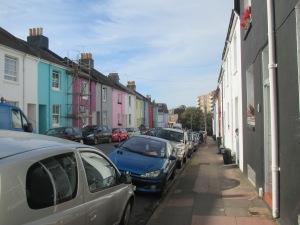
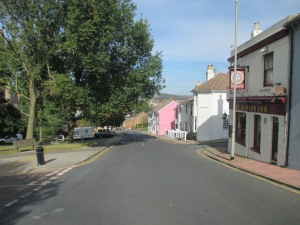


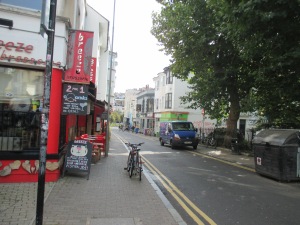





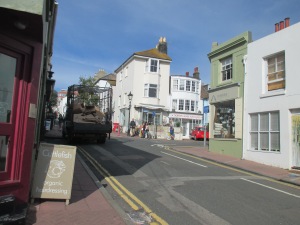












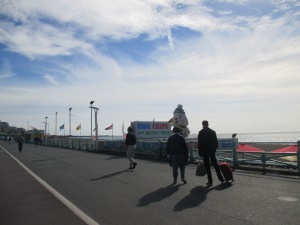



























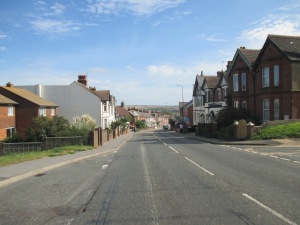








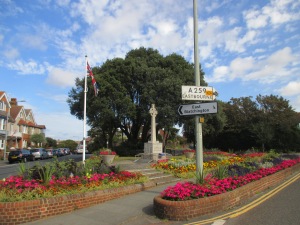






























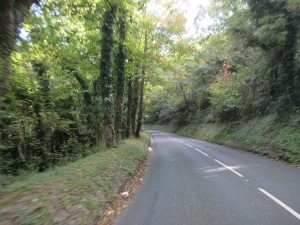
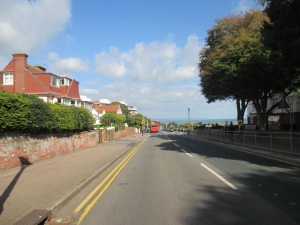





















































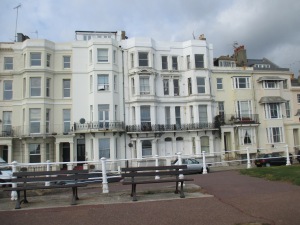









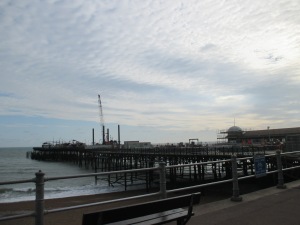















































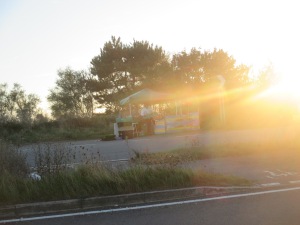






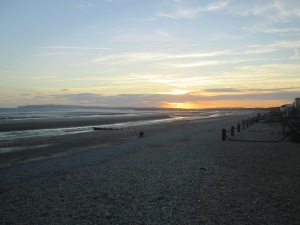
































Dan- you are a mandy-a milly molly mandy-what a carry on spending all night wandering around the beach looking for your tent! Look after your brain, you can’t get it replaced. Are you looking forward to getting home and resting up?